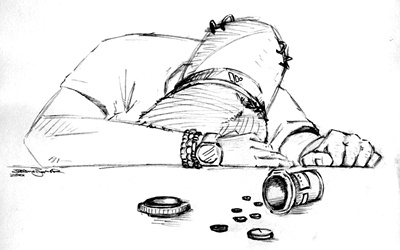All Nonfiction
- Bullying
- Books
- Academic
- Author Interviews
- Celebrity interviews
- College Articles
- College Essays
- Educator of the Year
- Heroes
- Interviews
- Memoir
- Personal Experience
- Sports
- Travel & Culture
All Opinions
- Bullying
- Current Events / Politics
- Discrimination
- Drugs / Alcohol / Smoking
- Entertainment / Celebrities
- Environment
- Love / Relationships
- Movies / Music / TV
- Pop Culture / Trends
- School / College
- Social Issues / Civics
- Spirituality / Religion
- Sports / Hobbies
All Hot Topics
- Bullying
- Community Service
- Environment
- Health
- Letters to the Editor
- Pride & Prejudice
- What Matters
- Back
Summer Guide
- Program Links
- Program Reviews
- Back
College Guide
- College Links
- College Reviews
- College Essays
- College Articles
- Back
Antibiotic Misuse
Picture this: you’ve just picked up a slug, a filthy stick, or something else that leaves your hands dirty. You look around for soap and water, but there is none. So, you squirt your hands with sanitizer, rub them together, and go on with your life. But do you realize that you have just provided aid to an epidemic that is sweeping our nation?
Antibiotic misuse is the unnecessary use of antimicrobial soaps, sanitizers, cleaners, disinfectants, medicines, and other antibacterial products. Unintentional or not, almost everyone in America contributes to this pestilence each day, and it has serious consequences. Antibacterial product misuse causes harmful microbes to live on, requiring new antibiotics to be made in order to combat these noxious bacteria. Every time you wash your hands with antimicrobial soap, take antibiotic medicine for a common cold, or eat meat or animal products treated with antibiotics, you cause antibiotic resistance. There are many types of antibiotic misuse, but the most common ones include unnecessary prescriptions, incomplete exposure, and overuse.
Unnecessary prescriptions are very common in today’s world, where people, when uncomfortable, seek immediate relief of pain or illness. If you go to the doctor’s complaining of a common cold, there is nothing the doctor can give you to cure your sickness, because colds are viral infections. The only way to combat viruses is with vaccines, and there is not a current vaccine for the common cold. But if you are unhappy and sick, and want something to rectify your illness, the doctor might prescribe an antibiotic. You take that antibiotic, and it does not cure your cold. Over-the-counter medications can alleviate the symptoms of colds and other viral infections, but they do not cure them; only vaccines do. But in the meantime, while you take this antibiotic and it does nothing to fight the cold, other bacteria inside of you develop resistance to it. If an antibiotic medication claims to kill 99.9 percent of bacteria, thousands and sometimes millions of bacteria—the resistant ones—survive and reproduce. These resistant microbes, with greater fitness, live on. This renders the antibiotic useless for you, because over time, the majority of bacteria inside of you, which multiply rapidly, become resistant to it. And it’s not just you—anyone who takes antimicrobial medication for a viral infection contributes to the widespread plague of antibiotic resistance. That is why you should only take antibacterial medicine when it is absolutely necessary.
Incomplete dosage and exposure is the opposite of unnecessary prescriptions, but is just as harmful. Imagine that you’ve been sick with a bacterial—not viral—infection for a few days, and have been taking an antibacterial medicine that has helped battle the illness. You feel better, and stop taking the medicine, presuming that you are cured of the illness. However, that is not the case. Even after symptoms disappear, the harmful bacteria live on. If you stop taking the antibiotic before the dosage has advised, due to feeling better, the bacteria continue to burgeon, and there is a chance of the illness returning. That is one of the reasons to follow directions as prescribed on medicine bottles or by a doctor. This misuse also includes washing your hands with soap for less than twenty seconds, a mistake many people make each time they scrub their hands. Always make sure to sing your ABCs or count to twenty when applying soap.
Overuse of antimicrobial products is the most common misuse of antibiotics. It includes using soaps, sanitizers or cleaners that contain antibacterial active ingredients. Contrary to popular belief, sanitizers and soaps do not need to be antimicrobial to effectively kill germs. Sanitizers with non-antibiotic active ingredients, like alcohol or peroxide, as well as glycerin soaps, work just as well as their antibacterial counterparts; plus, they do not aid the growing national disaster of antibiotic misuse.
In order to thwart the nationwide epidemic of antibiotic misuse, it is very important to take antibiotic medicine only when absolutely needed, take medicine for as long as advised by doctors or prescriptions labels, and to wash your hands for at least twenty seconds with non-antimicrobial soaps and cleaners. Together, we can prevent the outbreak of antibiotic resistance.

Similar Articles
JOIN THE DISCUSSION
This article has 0 comments.
